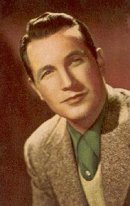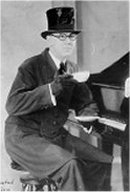Radio Born and Bred in St. Louis
Harry Babbitt
 Harry Babbitt
Harry Babbitt
11/03/1913 – 04/09/2004
Harry Babbitt, a big band singer who once voiced the laugh of Woody Woodpecker, died on April 9 from age-related causes. He was 90.
Known as “Handsome Harry,” Babbitt served in the Navy during World War II. When he wasn’t on duty, however, his smooth voice accompanied the Kay Kyser Band at the Waldorf-Astoria in New York, the Aragon Ballroom in Chicago and the Hollywood Canteen, a USO club.
The St. Louis native sang on several hits, including “The White Cliffs of Dover,” “Three Little Fishies,” “(Lights Out) ‘Til Reveille” and “The Umbrella Man.” He provided the distinctive laughter of Woody Woodpecker on Kyser’s 1948 novelty tune of the same name.
Babbitt appeared in seven movies that starred Kyser, and on the NBC quiz show, “Kay Kyser’s Kollege of Musical Knowledge.” As a solo artist, he recorded “Frosty the Snowman” and “All I Want for Christmas Is My Two Front Teeth,” complete with a childish lisp. He also spent a decade performing on the weekday CBS radio program, “The Second Cup of Coffee Club,” and briefly hosted the musical TV show, “Glamour Girl.”
In 1964, Babbitt retired from show business. He spent 20 years working in real estate, but returned to performing in 1985 when Kyser died. Babbitt obtained the rights to the band’s name and its song library from Kyser’s widow and toured the country until the mid-1990s. An interview with Babbitt will appear in the upcoming documentary, “Kay Kyser, the Ol’ Professor of SWING!”



